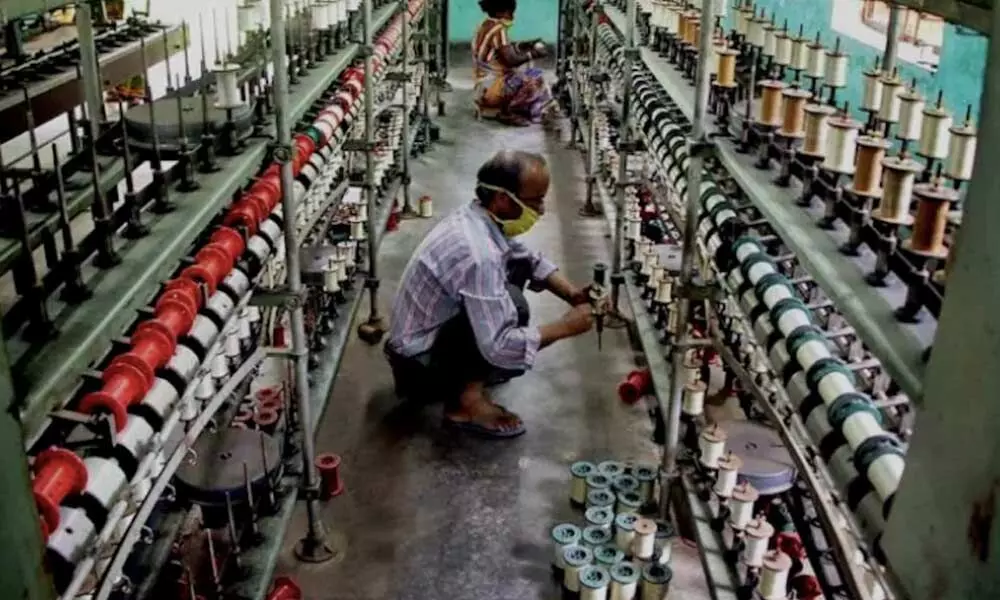Live
- Manu Bhaker applied for Khel Ratna but was shockingly overlooked: Sources
- Jagga Reddy's 'Prajasabha' in Sangareddy Postponed
- HYDRA Commissioner Ranganath Visits ORR, Inspects Multiple Lakes
- Improvement in Sriteja's Health Condition; Ventilator Removed and Liquid Diet Administered
- Former SC judge V. Ramasubramanian appointed as NHRC Chairperson
- Shyam Benegal: A true inspiration for aspiring film-makers
- Heavy snow forecast in Japan through Tuesday
- Legendary film-maker Shyam Benegal is no more
- Hackers steal over $12.7 billion in over 1,000 crypto heists to date
- BGT: 'Rohit is short of confidence with self-doubts', opines Manjrekar
Just In

Union Cabinet approves Production Linked Incentive Scheme for Textiles
Union Cabinet today approved the Production Linked Incentive (PLI) Scheme for Textiles for MNF Apparel, MMF Fabrics and 10 segments/products of Technical Textiles. Under it, incentives worth Rs 10,683 crore will be provided over five years
Union Cabinet today approved the Production Linked Incentive (PLI) Scheme for Textiles for MNF Apparel, MMF Fabrics and 10 segments/products of Technical Textiles. Under it, incentives worth Rs 10,683 crore will be provided over five years.
PLI for Textiles along with RoSCTL, RoDTEP and other measures of Government in the sector e.g., providing raw material at competitive prices, skill development etc. will herald a new age in textiles manufacturing.
Briefing reporters in New Delhi, Textiles Minister, Piyush Goyal said, this will positively impact states like Gujarat, Uttar Pradesh, Maharashtra, Tamil Nadu, Punjab, Andhra Pradesh, Telangana and Odisha.
PLI scheme for Textiles is part of the overall announcement of PLI Schemes for 13 sectors made earlier during the Union Budget 2021-22, with an outlay of Rs. 1.97 lakh crore. With the announcement of PLI Schemes for 13 sectors, minimum production in India is expected to be around Rs. 37.5 lakh crore over 5 years and minimum expected employment over 5 years is nearly 1 crore.
PLI scheme for Textiles will promote the production of high-value MMF fabrics, Garments and Technical Textiles in the country. The incentive structure has been so formulated that the industry will be encouraged to invest in fresh capacities in these segments. This will give a major push to the growing high-value MMF segment which will complement the efforts of the cotton and other natural fibre-based textiles industry in generating new opportunities for employment and trade, resultantly helping India regain its historical dominant status in global textiles trade.
The Technical Textiles segment is a new age textile, whose application in several sectors of the economy, including infrastructure, water, health and hygiene, defence, security, automobiles, aviation, etc. will improve the efficiencies in those sectors of the economy. The government has also launched a National Technical Textiles Mission in the past for promoting R&D efforts in that sector. PLI will help further, in attracting investment in this segment.
There are two types of investment possible with a different set of incentive structures. Any person, (which includes firm/company) willing to invest minimum Rs 300 Crore in Plant, Machinery, Equipment and Civil Works (excluding land and administrative building cost) to produce products of Notified lines (MMF Fabrics, Garment) and products of Technical Textiles, shall be eligible to apply for participation in the first part of the scheme.
In the second part, any person, (which includes a firm/company) willing to invest a minimum of Rs 100 Crore shall be eligible to apply for participation in this part of the scheme. In addition, priority will be given for investment in Aspirational Districts, Tier 3, Tier 4 towns, and rural areas and due to this priority Industry will be incentivized to move to the backward area. This scheme will positively impact especially States like Gujarat, UP, Maharashtra, Tamilnadu, Punjab, AP, Telangana, Odisha etc.
It is estimated that over five years, the PLI Scheme for Textiles will lead to a fresh investment of more than Rs 19,000 crore, cumulative turnover of over Rs 3 lakh crore will be achieved under this scheme and, will create additional employment opportunities for more than 7.5 lakh jobs in this sector and several lakhs more for supporting activities. The textiles industry predominantly employs women; therefore, the scheme will empower women and increase their participation in the formal economy.

© 2024 Hyderabad Media House Limited/The Hans India. All rights reserved. Powered by hocalwire.com







